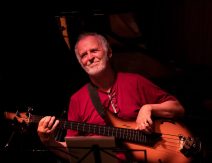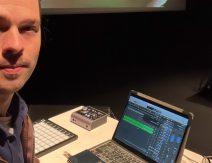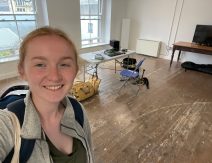

OTHER SIDE OF THE TRACKS Q&A - Izumi Kimura, Cora Venus Lunny & Anthony Kelly on ‘Folding’
- Interviews / Q&As
The development of a musical work begins a long time before an audience sees it, with inspiration, creation, choices, and many hours of work in rehearsal, practice, recording, and organisation. We love hearing the stories of how albums or concerts get from their initial seeds of thought to the final production, and how different musicians think about their creative process and work they do. Other Side of the Tracks gives us insights into this process from a range of musicians, and provides some fantastic perspectives on music, inspiration, work, and life.
Folding is the new vinyl LP and CD of collective compositions featuring piano by Izumi Kimura, violin & viola by Cora Venus Lunny and field recordings by Anthony Kelly. The wonderfully nuanced music of Kimura and Lunny folds with immersive field recordings by Kelly to form a sonically rich response to the coastal townlands of Dún Laoghaire, County Dublin, Ireland. Born in Japan, but based in Ireland for over 25 years, Izumi Kimura is a much-respected figure in the Irish music scene, acclaimed for her gentle but fearless improvisational approach. Cora Venus Lunny (they/them), is an acclaimed composer and violinist, known for their incredible technical skill and daring improvisation, and one of three recipients of the BAN BAM commissioning award in 2020. Anthony Kelly is an artist based in Dún Laoghaire, Dublin, Ireland whose practice involves sonic and visual approaches, including painting, drawing, sound recording, sculpture, sound installation, film & video, and improvised sound performance.
You can buy 'Folding' now from Farpoint Recordings or on Bandcamp, by clicking here.
Q. Could you tell us a bit about how this project developed from first inspiration to the final album?
Izumi
This is an ongoing project which started when I was Musician in Residence in Dun Laoghaire - Rathdown County Council in summer 2019, exactly 2 years ago. I wanted to explore the merging between the environmental and musical sounds.
If music happens in harmony between our internal and external sounds, I want to practice the ear capable of listening to every sound as beautiful music - simply because the life is more fun that way. This project is the excuse to practice this.
One of the things that planted a seed in me was a paragraph in Zen Mind, Beginner’s Mind by Shunryu Suzuki I read a few years back. Suzuki Roshi said “When we hear the bird, bird is “me,” you know, already. I am not listening to bird. Bird is here, in my mind already, and I am singing with the bird. If you think, when you are reading something, “Bird is there,” you know, “bluejay is over my roof - bluejay is singing, but their voice is not so good,” when you think in that way, that is noise. When you are not disturbed by the bluejay, the bluejay will come right into your heart, and you will be a bluejay, and bluejay will be reading something.”
Another one was this; A student “If a tree falls in the forest and no one hears it, does it make a sound?” Suzuki Roshi “It doesn’t matter.” I had these words somewhere in me when I started the residency. But then I forgot about them, until it finished.
At the beginning, I started to look for a collaborator whom I could work with in the environmental sound part of the project. And I found Anthony. He has been doing exactly that - making field recordings of Dun Laoghaire. When I discovered his work I knew straightaway that it was a rare encounter and gift. And it turned out to be a wonderful collaboration, as he came back with inexhaustible amount of beautiful recordings and ideas.
With Cora, whom I really enjoy playing together, we have a way of communicating with each other which I think is quite special. She is highly sensitive and amazingly refined at her instrumental technique at the same time as wild and dark as the bottom of the abyss, and able to express massive range and the depth of emotions.
Anthony
Izumi discovered an ongoing project that I have been working on called A Sound Map of Dún Laoghaire and got in touch! We talked lots about sounds relating to place, ideas about home, and that field recordings can have a musical quality. Because we live in Dún Laoghaire we found we both had many sonic experiences in common. And all three of us have a lot of experience with improvisation and playing within different group formats; jazz, sound art or otherwise. We like the freedom and possibilities that come with working this way. It was great that Izumi got the DLR musician in residence and invited Cora & I to work with her! After the concerts which were part of Izumi's residency we felt we had something that could also work as a recording so we set about making a studio version together.
Cora
Izumi had invited us both in to be part of this Residency concert, so that was beautiful to do it live the first time! I think we all liked it so much that we really wanted to make it into an album, as I remember it! Personally, for me, it’s one of my favourite things I’ve ever worked on - there’s just something about it that I really like, so it was great to be able to record it.
Q. This work is a response to a very specific place, reflecting Dún Laoghaire. How do you think place comes into your work, or how do you think about space and place when you're creating?
Anthony
I think that Folding is a kind of ecological response to Dún Laoghaire. The sounds that I listen to and often hear, to my ear, can have a lovely musicality (tuneful, discordant etc.) and that's often what I'm trying to capture when out recording. Sometimes I prefer a recording that I think might have some of this over one which might be technically good. Generally, they are all one take recordings, or a combination of recording perspectives taken from the same timeline. I don't put any effects on these recordings, I just try to listen and find any potential narrative(s) or ambience and bring that out a bit more in the editing process, I try to leave room for Cora & Izumi and ultimately the listener to step into. Sometimes I think I accidentally assume aspects of the subject matter's character while I'm tumbling around in the sounds!
The field recordings on the record have lots of sound-marks that people from Dún Laoghaire might be familiar with, but I think the contributions & combination of the three of us has the potential to create something that can appeal to listeners anywhere. All the same, it was great to have to have the rich sonic environment of Dún Laoghaire as our inspiration for the project.
Cora
I actually lived in Dun Laoghaire for a while myself, and have friends there, I spent quite a lot of time there, so there was always a connection to the place for me. I might imagine certain gardens or places when I was closing my eyes and listening to the sounds. There’s a definite Dun Laoghire vibe - knowing the place and having been there and experienced stuff there I think definitely would have an influence on your emotions when connecting with the field recordings. That’s probably a big reason why this work is so personal - Dun Laoghaire is quite a special place for me.
If you were to take the album in your headphones on a walk, a stroll around Dun Laoghaire might be an excellent way of experiencing it.
Q. Musically speaking, how do you develop these kinds of works from a starting point to a 'final' version? Or multiple versions?
Izumi
The communication between all of us involved in the residency was smooth, intuitive and fun. We all had gentle and caring approach towards the project and each other, which I was very grateful for. This openness and communication are actually the most important aspect for me in making music. The album title Folding, expresses our process. From this environment, things unfolded naturally and we trusted in whatever being folded and unfolded.
Music is improvised, although I knew the form as I mapped out the form by patchworking the field recordings in advance, but I wanted the music to be intuitive so I had to be careful not to overdo the preparation. I think the delicate balance of being an imperfectionist is interesting.
We talked about many things, but very little about musical materials, almost nothing about notes we were going to play. Sometimes the music is revealing the vulnerability, which we chose to leave in.
I also wanted three of us to be interacting equally with the roles in flux. The field recordings don’t change in response to what we play of course, but the sound of the nature has such depth naturally anyway it seem to change every time, and made us play very differently every time.
We did two takes in the studio, which are two totally different music - and took the first take after all, and with no edits.
For me, this creative process is to go deeper into the part of myself that has been silenced for a long time. It can be called the feminine side, though not limited to. It’s ultimately about trusting something within us that’s much bigger than ourselves. So this is really only the beginning of a massive project.
Cora
Creating this - it’s free improv, spontaneous comoposition, so it’s more like a conversation between Izumi and myself where Anthony’s field recordings are part of the conversation, or maybe they’re the scene in which the conversation takes place somehow. I don’t know - it’s all very hazy! We don’t really discuss the music that much, we tend to work with it more in an organic way.
It’s hard to say how they related to the live performances - that’s the thing about spontaneous composition, it is different every time in some fundamental way, even if it’s related or similar - there’s going to be some way in which it veers away.
I think we were inhabiting a certain realm, conjured up a certain atmosphere that we just developed a bit when we went into the studio.
For me the process of spontaneous composition is more about my own state of consciousness, letting go of thought during the process, rather than going ‘Hmm, what kind of music am I going to make?’ Getting thought involved usually is not very helpful - if I start thinking I tend not to like the results!
Anthony
From my perspective I try to bring recordings that have an openness in quality. By this I mean sounds that allow room for other strands of musicality to weave their way in and around and to engage with what's happening, be it in a quiet and intimate way like in the 'Dry Leaves' composition or the unfolding tensions and release in the dialogue between piano, violin and bird in 'Blackbird Sings To Nearby Bird'.
I like to imagine the recorded version of Folding is just one possible permutation of the music. Because we improvise, the music is in flux, offering different versions 'in the moment', so each time it will be different. I think that possibility can be a great thing for listening. In a live context I play with the field recordings, bringing them in and out, raising or lowering the volume in response to Izumi and Cora. I also improvise with small table-top electronic instruments and hand-made devices, and like to unlock small sounds from inanimate objects.
Q 4. What would you like listeners to experience when listening to the album?
Izumi
As for what I would like listeners to experience - I think Anthony’s answer is perfect - An open invitation to step into this sonic world we have been creating and hopefully to be intrigued and moved by it in some way!
Cora
I want them to let their imagination roam freely. I’d just like it to help people be transported to somewhere else. Where that is is is going to be different for every single person who listens - but it might still have that Dun Laoghaire flavour - a Dun Laoghaire - flavoured mystical getaway!
Anthony
An open invitation to step into this sonic world we have been creating and hopefully to be intrigued and moved by it in some way!





